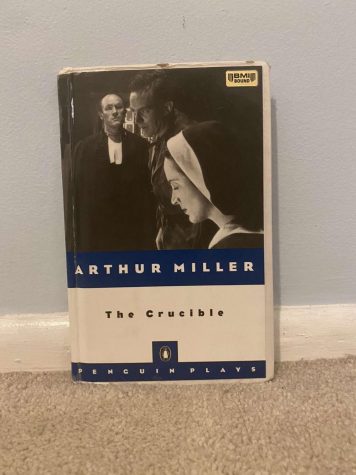Reed Books: The Crucible Full Play Review
February 27, 2020
The Crucible is a well-constructed play that, while tinged with a bit of self-indulgence, still manages to convey its themes effectively.
 The main issue with this play is the clear self-indulgence exhibited by Miller as John Proctor. Miller, the author, cheated on his wife of ten years with Marilyn Monroe, and was then divorced by her for John F. Kennedy. Proctor, also in a tense marriage, cheats on his wife with their servant, Abigail Williams. When writing this play, Miller made Abigail particularly mean and abusive, almost framing her as an evil “seductress”. This is clear by his deletion of the Act 2 Scene 2, in which Abigail acts crazy, and the readers can finally see the effect of the patriarchy and theocracy on this young girl. Instead, Miller deletes this scene, and shifts the blame from Proctor’s character to Abby. Along with this, towards the end of the play, Proctor’s wife Elizabeth apologizes to him for his own adultery. She claims that she was too cold to him, and it prompted him to cheat on her. Clearly, this is Miller’s own fantasies playing out through his writing; no real woman would ever apologize for her husband’s infidelity.
The main issue with this play is the clear self-indulgence exhibited by Miller as John Proctor. Miller, the author, cheated on his wife of ten years with Marilyn Monroe, and was then divorced by her for John F. Kennedy. Proctor, also in a tense marriage, cheats on his wife with their servant, Abigail Williams. When writing this play, Miller made Abigail particularly mean and abusive, almost framing her as an evil “seductress”. This is clear by his deletion of the Act 2 Scene 2, in which Abigail acts crazy, and the readers can finally see the effect of the patriarchy and theocracy on this young girl. Instead, Miller deletes this scene, and shifts the blame from Proctor’s character to Abby. Along with this, towards the end of the play, Proctor’s wife Elizabeth apologizes to him for his own adultery. She claims that she was too cold to him, and it prompted him to cheat on her. Clearly, this is Miller’s own fantasies playing out through his writing; no real woman would ever apologize for her husband’s infidelity.
Still, the play manages to convey the horrors and hypocrisy in the theocratic government at the time. In having Proctor die as a martyr, Miller shows the hope that the public will eventually come around to doing what’s right – in this case, revolting against the courts. While this was a bit unrealistic for the time, it still makes general sense, as after the witch trials, the Massachusetts government was destroyed.






















































